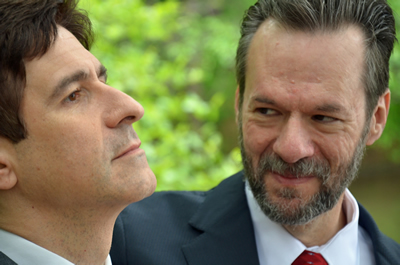Baldwin Auditorium was packed on this decidedly wintry night. The reason for braving the weather was the renowned St. Olaf Choir, one of the gold standards of collegiate choirs. Throughout the program, their attacks were crisp and coordinated, their balance and blend were accomplished and polished. Their attention to inner parts in polyphonic selections was impressive.
Founded in 1912 and known as a creative force in the a cappella tradition, the St. Olaf Choir, under its current conductor Anton Armstrong, is about half-way through its eastern tour, which includes performances and workshops from Massachusetts to North Carolina. They are well known to listeners of the syndicated “Sing for Joy” (heard Sunday mornings on WCPE, 89.7, from Wake Forest/Rolesville), where their numerous recordings are frequently featured. The choir is comprised of full-time undergraduate students at St. Olaf College, a liberal arts institution in Northfield, Minnesota.
The program opened with three selections from the traditional classical repertoire, each performed with an appropriate and well-prepared ensemble of strings and woodwinds. First was Mozart’s “Venite Populi,” K.260, and then Christian Gregor’s “In Slumber, Peaceful Slumber.” This set closed with Bach’ “Der Geist Hilft,” S.236, the second of his six motets. Each was performed with charm and elegance.
The second set was comprised of mid 20th-century works sung unaccompanied, which is St. Olaf’s forte. “A Spotless Rose,” by Herbert Howells, was lush and richly sung. “O Crux,” by Mark Jennings, was especially notable for its gorgeous dissonances and balanced swells and decrescendos. This is a new piece recently or soon to be published by Hinshaw Music that stands to be a favorite among college and accomplished church choirs. Randall Thompson’s well-known “Alleluia” was sung at the ideal tempo, and here again, the inner parts and changes in mood were ideally accomplished. This set closed with F. Melius Christiansen’s effervescent and exciting motet setting of the hymn “Praise to the Lord, the Almighty” (“Lobe den Herren”).
After intermission, the chorus sang two more pieces in the works (in manuscript): “Prayer of St. Frances,” in a setting that included piano, bassoon and two oboes, by Charles Forsberg (b.1942), and “Vanity of Vanities,” for chorus, strings and solo viola, by Peter Hamlin (b.1951). The guest artist playing the viola was Charles Gray, who has degrees from Wheaton College, the University of Michigan, and Eastman, and is now on the music faculty at St. Olaf. “Vanity of Vanities,” with text taken from the free verse poetry of Ecclesiastes 1:2-11, was especially impressive with text, strings and solo viola woven together in a most clever blend of warm and enchanting sounds.
A set of three pieces, subtitled Music in the Night, began with Sid Robinovich’s “Prayer before Sleep,” sung in Hebrew. Eric Whitacre’s bewitching setting of Octavio Paz’s (trans. Muriel Rukeyser) equally bewitching poem, “Water Night,” was beautifully sung with dynamic expressiveness which is the blossom of all music. This set closed with a fine rendition of Ralph Vaughan Williams’ ethereal and transcendent “Serenade to Music.” Composed in 1938 as a tribute to Sir Henry J. Wood for the celebration of his fifty years in service to music, Vaughan Williams chose his text from Shakespeare’s The Merchant of Venice and assigned the solo parts to the sixteen internationally-acclaimed artists engaged for the concert. Among many dignitaries present at the occasion was Rachmaninov, who is said to have had tears in his eyes during the performance of this piece, and who later wrote that he had never before been so moved by music. The soloists in Durham, all members of the choir, were outstanding, as was piano accompanist Paul Melcher — here and in other selections. The viola solo by Gray took the performance to a higher level still.
The concert closed with four spicy spirituals, two with solos by a pair of fine male vocalists from the choir. We heard “Hark, I Hear the Harps Eternal,” arr. Alice Parker, “This Little Light of Mine,” arr. Moses G. Hogan, “City called Heaven,” arr. Josephine Poelinitz, and “Ride On, King Jesus,” another Hogan arrangement. The choir was at home and swinging in this genre.
For encores, Armstrong chose a gospel choir arrangement by Keith McCutchen of “Amazing Grace” and then, after some clearly heartfelt words of appreciation for Rodney Wynkoop, Roberta Van Ness of Hinshaw Music, and others, the evening ended with a deeply-moving rendition of “Beautiful Savior.” There can be no doubt that all those in attendance left for home with a sense of satisfaction and peace.











